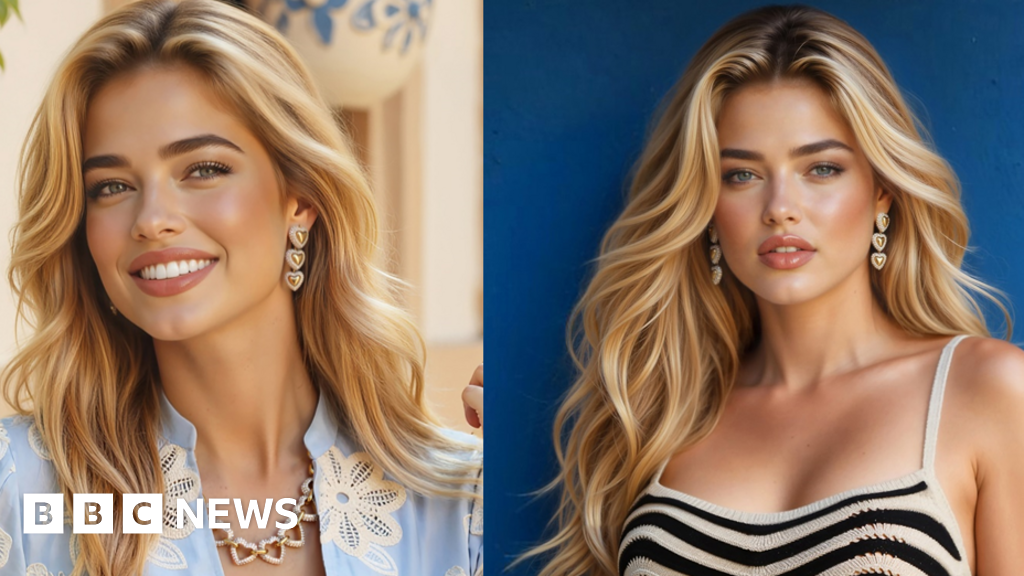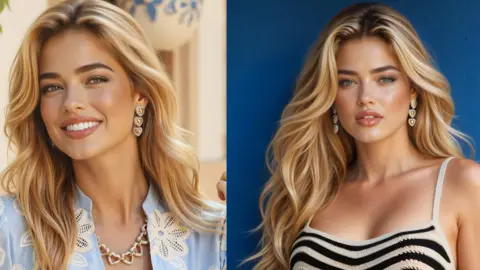 Seraphinne Vallora
Seraphinne ValloraThere’s a new supermodel in town. She’s striking, stylish… and not real.
In August’s print edition of Vogue, a Guess advert features a flawless blonde model showing off a striped maxi dress and a floral playsuit from the brand’s summer collection.
In small print in one corner, the ad reveals that she was created using AI.
While Vogue says the AI model was not an editorial decision, it is the first time an AI-generated person has featured in the magazine.
The advert has been met with controversy and raises questions about what this means for real models who have fought for greater diversity, and for consumers – particularly young people – already struggling with unrealistic beauty standards.
Seraphinne Vallora is the company behind Guess’s controversial advert.
Its founders, Valentina Gonzalez and Andreea Petrescu, tell the BBC they were approached by Guess’s co-founder, Paul Marciano, on Instagram and were asked to create an AI model as part of the brand’s summer campaign.
“We created 10 draft models for him and he selected one brunette woman and one blonde that we went ahead and developed further,” Gonzalez says.
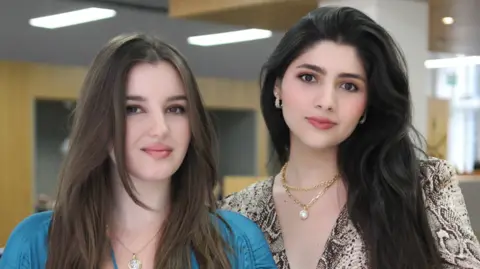 Seraphinne Vallora
Seraphinne ValloraShe explains there’s often a misconception that AI image generation is simple, saying it is actually a complex process.
The company has five employees who create AI models, and it can take up to a month from idea inception to the completed product. The pair say they charge anywhere up to low six figures for a client like Guess.
‘Disheartening’
But Felicity Hayward, a plus-size model who has been in the industry for more than a decade, says using AI models in fashion campaigns “feels lazy and cheap”.
“Either Guess is doing this to create a talking point and get free publicity or they want to cut costs and don’t think about the implications of that.”
She describes Vogue’s decision to include the advert as “very disheartening and quite scary”, and worries it could undermine years of work towards more diversity in the industry.
The fashion world was making real progress to be more inclusive in the 2010s – the decade saw Valentina Sampaio become the first openly trans model to walk for Victoria’s Secret, Halima Aden was the first hijab-wearing model in global campaigns, and brands like Savage x Fenty featured plus-size models on the runway.
But in recent years, Hayward believes, the industry has slipped backwards because “these people are just not getting booked any more”.
And the use of AI models is “another kick in the teeth, and one that will disproportionately affect plus-size models”, she warns.
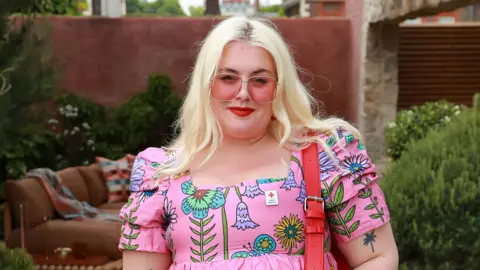 Getty Images
Getty ImagesGonzalez and Petrescu are adamant they don’t reinforce narrow beauty standards.
“We don’t create unattainable looks – actually the AI model for Guess looks quite realistic,” Petrescu says. “Ultimately, all adverts are created to look perfect and usually have supermodels in, so what we are doing is no different.”
The pair admit the AI images on their company’s Instagram page are lacking in diversity and promote unrealistic beauty standards. They say they have tried to be more inclusive, but it’s the users who don’t engage much with those posts.
“We’ve posted AI images of women with different skin tones, but people do not respond to them – we don’t get any traction or likes,” Gonzalez tells the BBC.
“At the end of the day, we are a business and use images on Instagram that will create a conversation and bring us clients.”
The company is yet to experiment with creating plus-size women, claiming “the technology is not advanced enough for that”.
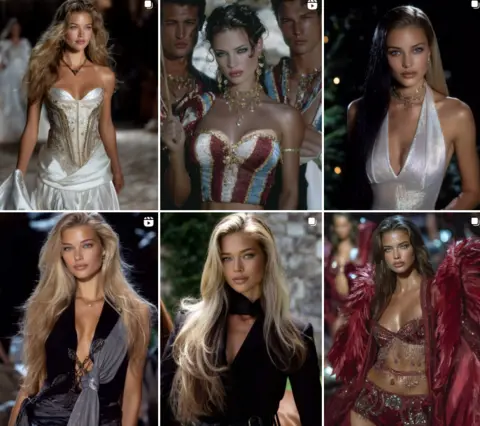 Seraphinne Vallora
Seraphinne ValloraAn ad campaign by Dove in 2024 was designed to highlight the biases in AI. In the advert, an image generator is asked to create the most beautiful woman in the world and produces virtually indistinguishable women who are young, thin and white, with blonde hair and blue eyes. The images generated look similar to the Guess AI model.
Hayward worries that seeing these unattainable images could have an impact on people’s mental health and negatively affect their body image.
Concern around unrealistic beauty standards and the damaging effects they can have is nothing new. But unlike traditional airbrushing, which at least began with a real person, these AI models are digitally created to look perfect, free from human flaws, inconsistencies or uniqueness.
While some high-profile figures such as Ashley Graham, Jameela Jamil and Bella Thorne have spoken out against image editing and refuse to have their pictures Photoshopped, the use of AI sidesteps such conversations entirely.
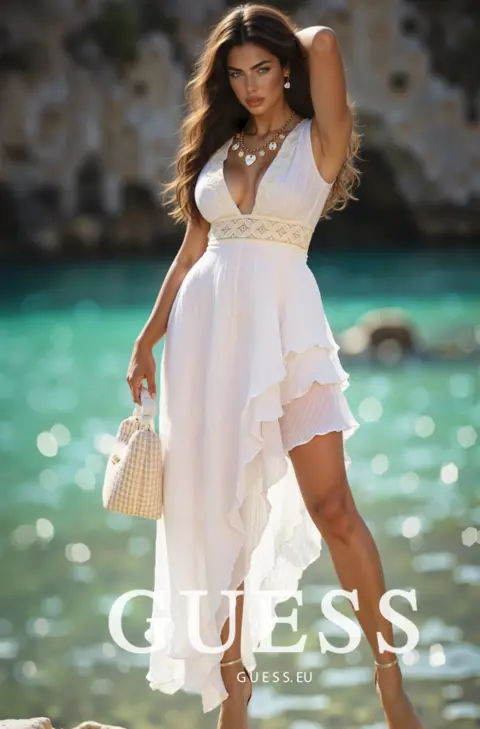 Seraphinne Vallora
Seraphinne ValloraVogue’s decision to include an AI-generated advert has caused a stir on social media, with one user on X writing: “Wow! As if the beauty expectations weren’t unrealistic enough, here comes AI to make them impossible. Even models can’t compete.”
Vanessa Longley, CEO of eating disorder charity Beat, tells the BBC the advert is “worrying”.
“If people are exposed to images of unrealistic bodies, it can affect their thoughts about their own body, and poor body image increases the risk of developing an eating disorder,” she says.
‘Exceptionally problematic’
Adding to the issue is the lack of transparency – it is not a legal requirement to label AI-generated content in the UK.
While Guess labelled its advert as AI-generated, the disclaimer is small and subtle. Readers may overlook it and, at a glance, the image appears entirely lifelike.
Sinead Bovell, a former model and now tech entrepreneur, wrote an article for Vogue five years ago about the risks of AI replacing modelling.
She tells the BBC that not labelling AI content clearly is “exceptionally problematic” because it could have a detrimental impact on people’s mental health.
“Beauty standards are already being influenced by AI. There are young girls getting plastic surgery to look like a face in a filter – and now we see people who are entirely artificial,” she says.
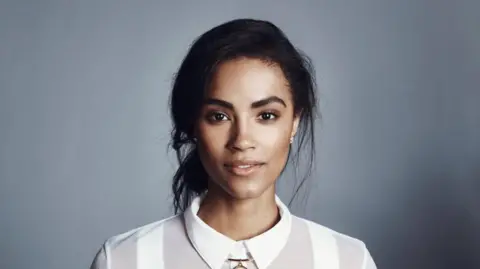 Sinead Bovell
Sinead BovellAside from the impact AI models could have on a consumer, especially if unlabelled, what about the impact of this technology on those working in the fashion industry?
Sara Ziff is a former model and founder of Model Alliance, an organisation that aims to advance workers’ rights in the fashion industry.
She says Guess’s AI campaign is “less about innovation and more about desperation and need to cut costs”.
More broadly, the former model thinks AI in the fashion industry is not inherently exploitative, but can often come at the expense of the people who bring it to life because there are many more staff involved in a photoshoot than just the model and the photographer.
“AI can positively impact the industry, but there need to be meaningful protections for workers,” she explains.
‘Supplement not replace’
Seraphinne Vallora rejects the notion that it is putting people out of work, and says its pioneering technology “is supplementary and not meant to replace models”.
“We’re offering companies another choice in how they market a product,” Petrescu explains.
The pair add that they have created jobs with their company, and part of the process of creating AI models requires them to hire a real model and photographer to see how the product looks on a person in real life.
However, its website lists one of the benefits of working with them as being cost-efficient because it “eliminates the need for expensive set-ups, MUA artists, venue rentals, stage setting, photographers, travel expenses, hiring models”.
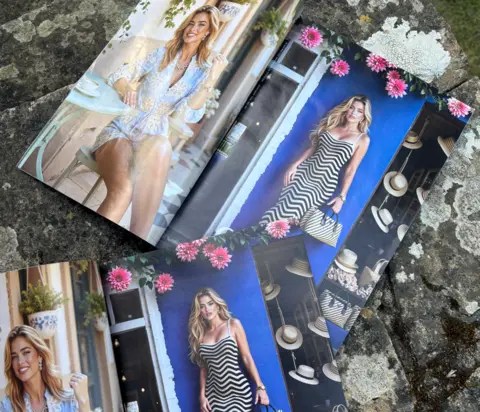 Seraphinne Vallora
Seraphinne ValloraVogue has come under fire for including the advert in its print edition, with one person on X saying the fashion magazine had “lost credibility”.
Bovell says the magazine is “seen as the supreme court of the fashion industry”, so allowing the AI advert to run means they are “in some way ruling it as acceptable”.
The BBC approached Vogue and Guess for comment. Vogue said it was an advert, not an editorial decision, but declined to respond further.
So, what does the future of the modelling industry look like?
Gonzalez and Petrescu believe that as their technology improves, they will be even more in demand by brands looking to do things differently.
Bovell thinks there will be more AI-generated models in the future, but “we aren’t headed to a future where every model is created by AI”.
She sees positives in the development of AI in the industry – predicting that anybody could “start to see ourselves as the fashion models” because we will be able to create a personal AI avatar to see how clothes look and fit.
However, she adds that we may get to the stage of “society opting out, and not being interested in AI models because it’s so unattainable and we know it’s not real”.


